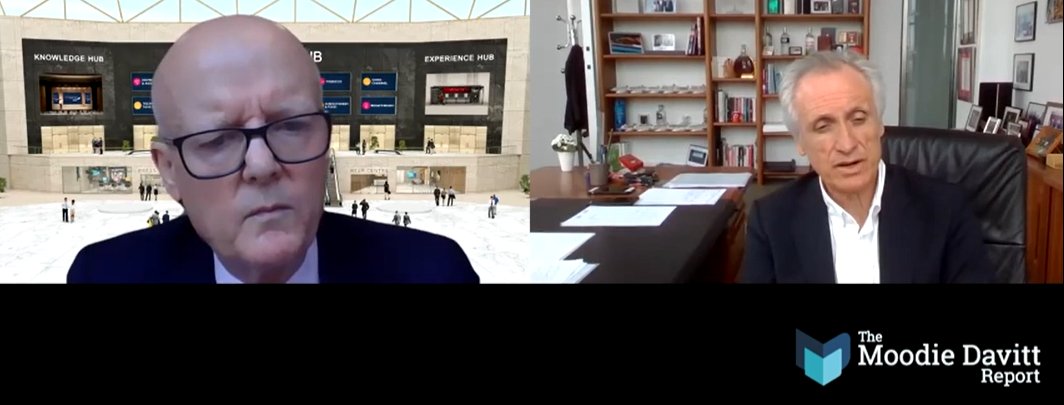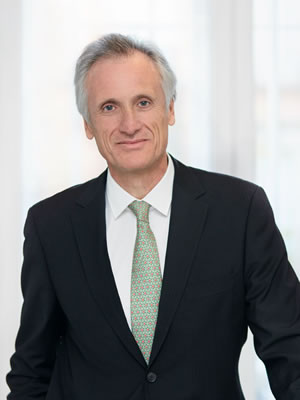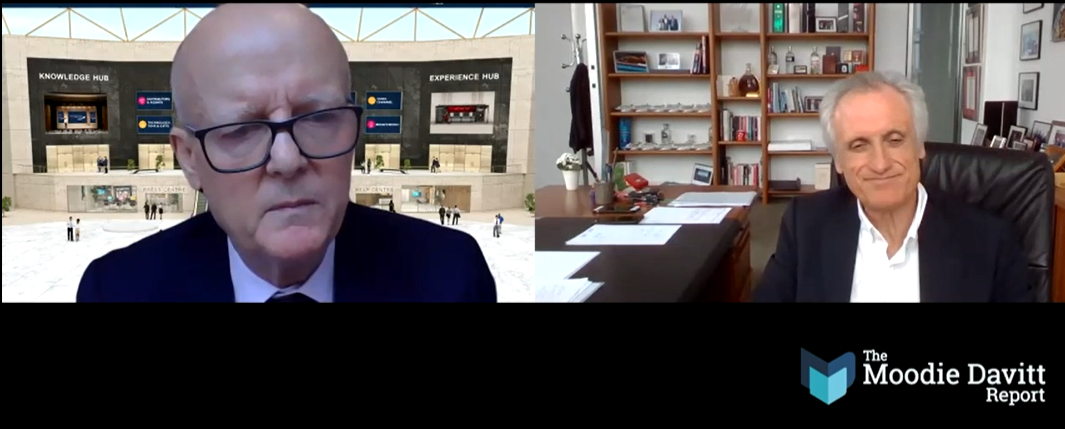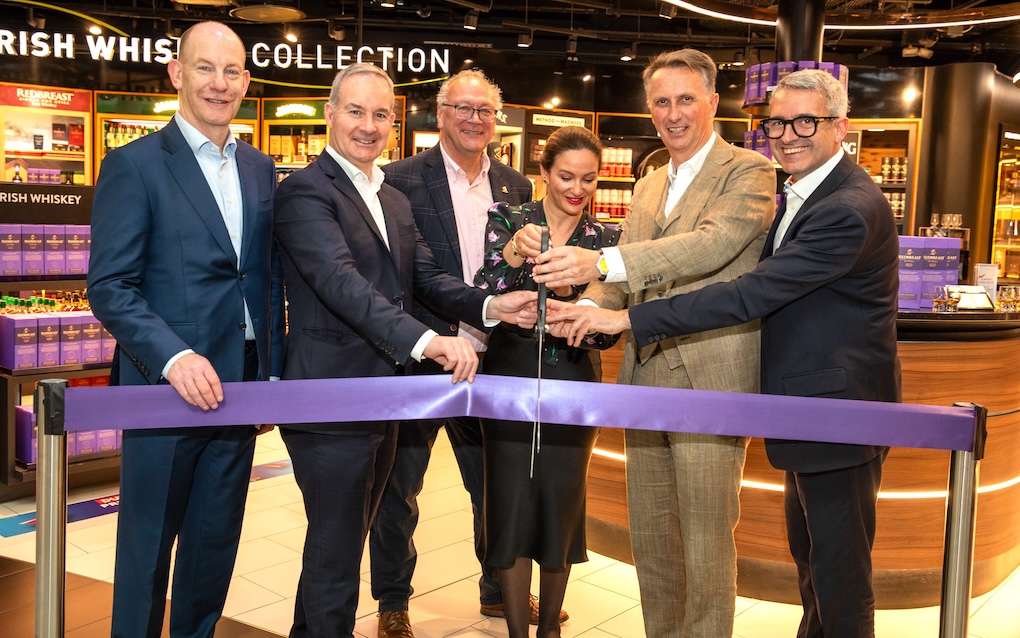INTERNATIONAL. Dufry CEO Julián Díaz has issued a strong message of resilience and collaboration with landlord and supplier partners in the wake of the travel retail giant’s new, streamlined organisational structure (see panel below) announced this morning.
In an exclusive video and podcast interview with The Moodie Davitt Report Chairman Martin Moodie conducted shortly after the announcement, Díaz said: “It’s very important to communicate one thing – Dufry is a good partner, with landlords, with airports, with suppliers. Partnership is not only a word, it is an action. And in these circumstances where the situation is very tough and very difficult for everyone, we really need to show what partnership is about.

“Dufry is going to be the best partner possible within these circumstances. We need to adapt the relationships [between companies] almost temporarily to the circumstances and we need to adapt very quickly. It is not something that can be negotiated in three, four or six months. The adaptation of the relationships in the business today between the different stakeholders requires a big trust modification. Today requires a different way of thinking in order to be very efficient.
“But to say something is very easy. The problem is always the same – how to make the ideas become reality. This requires a specific action plan for modifying the reality. This is the answer. Let us try very hard to see if we can altogether go forward.”
[Click on the icons above or below for video and audio interviews of the Julián Díaz interview]
| Key elements of the new-look Dufry organisation Dufry says that the changes announced on 9 June to its organisation are a response to “the new business environment”. The world’s leading travel retailer said the changes would accelerate growth and support profitability during the recovery phase of the COVID-19-related economic crisis and beyond. Here are the key components. • Integration of headquarters and divisions as well as grouping countries into a reduced number of seven clusters plus North America as compared to the current 23 clusters; |
Asked if Dufry had risked failure at any point during the crisis, Díaz replied: “No. I don’t think that the company has been in danger, even obviously though the uncertainty was very high – and still is very high.
“But I am talking about during the last week of February, beginning of March, April, and May where the business really was almost collapsed [in terms of sales]. But I think the company has done what in this specific situation was required. Number one, as I have always said, is to protect the liquidity. I think the cash and the use of the cash was restricted as much as possible.
“The second part was to control and reduce the fixed part of the cost structure and we have reduced both.”
Díaz also outlined how the company had protected its future via a combination of additional credit and capital raises (see panel below). “I think that the initiatives taken within the company and also the initiatives from a corporate point of view put us in the safest possible territory at that time [the depth of the crisis]. Today, the scenario is very similar. We have not burned the cash, which if we had would probably have destroyed the sustainability of the company. We are very, very focused on protecting the cash… but today the situation in terms of sustainability is ok.”
Reassuring brands about payments
Asked for his message to supplier partners, concerned about slow or even potential non-payments, Díaz said: “We understand the word partnership. During this process we are obviously concerned that our partners – especially the suppliers, the brand owners of the business – will suffer too. What we have communicated, and which is now the reality, is that as soon as we have a visibility – a certain visibility not full visibility as the uncertainty is obviously still very high – we will contact them (as we have done) in order to elaborate a plan for reopening and for paying the amounts that are outstanding in the balance.”

Q&A with Julián Díaz on supplier payments and concession fees
Martin Moodie: “You’ll be aware that some suppliers at the very highest level are very concerned with what’s happened in this channel, not just Dufry but with your peer group. There have been many examples of stock being taken back; there have been many examples of very serious delays in payment. And that has resulted in fears at the highest level of a word that we never thought we would utter, which is default – serious concerns held in serious quarters that some major players could default if this carried on.
“Now I think that you’re giving a very strong message out today Julián that default is not on the table; that your liquidity is sufficient, that the recovery will be sufficient; and that Dufry can not only honour its obligations, but come back to a position of strength?”
Julián Díaz: “Yes, the situation is difficult but it’s under control. As I said, we have enough cash in order to sustain the company for a long time. But the most important thing we are seeking in our business is to generate cash through the retail part… because while the support of the suppliers is very important for us, we are also capable of generating cash very quickly as soon as the businesses are initiated again.”

Concessions fees and the need for flexibility
Martin Moodie: “We’ve seen a number of things happen with Dufry and with all your rivals in the retail and restaurant sectors in terms of concession fees. We have seen deferred MAGs, cancelled MAGS and MAGs move to variable by agreement or even sometimes without agreement. There have been some examples of airports saying a contract is a contract. And there have been some hybrids. How do you stand today in terms of your concession obligations with your airport partners? And critically, how do you see those evolving going forward?
Julián Díaz: Obviously, there are difficult circumstances and I think during this time of closure there is not a significant issue [in terms of concession agreements]. The shops are closed, and we are not paying. Obviously, there are sometimes arguments but in general I think the situation has been very good in terms of relationships with landlords, especially with airport authorities.
“The second part comes when the shops will be reopened, and I think this is a significant challenge in terms of relationships. I suspect due to the negotiation processes that we have had, and also to the reality in some of the locations where we are operating today that the adaptation of the minimum annual guarantee to the reality of the business is a fact. Most of the contracts will be adapted to the reality of the business.” [For full comment, hear the Moodie Davitt Podcast]
| Dufry’s programme to boost capital structure and liquidity The measures announced on 23 April included:
|












